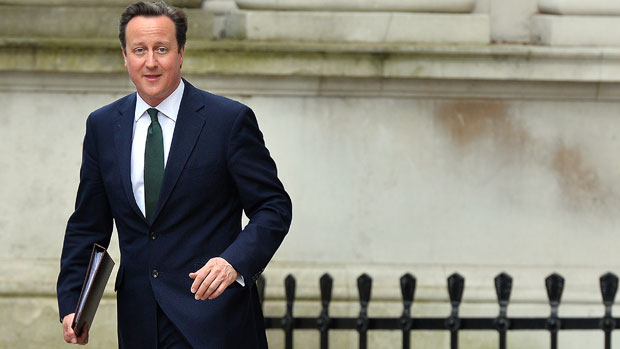Cameron battles UKIP threat with guarantee of EU vote
UKIP's surge prompts embattled PM to harden EU referendum promise by 'enshrining it in law'

A free daily email with the biggest news stories of the day – and the best features from TheWeek.com
You are now subscribed
Your newsletter sign-up was successful
DAVID CAMERON has "shifted ground" on Europe and says he is now prepared to introduce "legal safeguards" that will guarantee a referendum on Britain's membership of the EU takes place after the 2015 general election.
The Prime Minister's willingness to give MPs a vote on an in-out referendum that would enshrine the process in law is seen as a response to the growing electoral threat posed by UKIP. Nigel Farage's anti-EU party, which has described Cameron's promise of a referendum by 2018 as "meaningless", is expected to enjoy another surge in support today in local government elections taking place in many English shires.
The Daily Telegraph says UKIP has "campaigned successfully" on the claim that Cameron's promise of a referendum is "jam tomorrow". Polls suggest UKIP will win more than 20 per cent of the vote at today's elections and Conservative strategists believe the Tory party will lose as many as 500 council seats.
The Week
Escape your echo chamber. Get the facts behind the news, plus analysis from multiple perspectives.

Sign up for The Week's Free Newsletters
From our morning news briefing to a weekly Good News Newsletter, get the best of The Week delivered directly to your inbox.
From our morning news briefing to a weekly Good News Newsletter, get the best of The Week delivered directly to your inbox.
The PM has "always held back" from giving MPs a pre-election vote on a referendum because he knows it will "split the coalition and enrage pro-European Tories", says The Times. He has changed his mind partly because of UKIP's surging fortunes and partly due to pressure from within his own party. More than 100 Tory MPs have urged him to make such a move "as a way of overcoming scepticism of promised referendums, while undercutting UKIP's appeal".
The idea of "legislating" the referendum promise will be explored by No. 10's newest recruit, Jo Johnson, brother of London mayor Boris Johnson.
Nick Clegg, the Liberal Democrat leader, said today that the Tories' frantic "struggle" to deal with UKIP's rising influence was pulling Cameron away from the "centre ground" and making "day-to-day progress in the coalition" more difficult, The Guardian reports. Clegg, whose own party faces the prospect of coming fourth behind UKIP in today's poll, said he would "dig in my heels and make sure the centre of gravity of the government as a whole does not get pulled rightwards due to the internal dynamics of the Conservative party".
The deputy PM said Conservative policies on welfare, Europe and climate change were three "pre-eminent examples" of Cameron being pulled right. He also conceded that his coalition partner was "no longer the same political animal as presented before the 2010 general election".
A free daily email with the biggest news stories of the day – and the best features from TheWeek.com
-
 The environmental cost of GLP-1s
The environmental cost of GLP-1sThe explainer Producing the drugs is a dirty process
-
 Greenland’s capital becomes ground zero for the country’s diplomatic straits
Greenland’s capital becomes ground zero for the country’s diplomatic straitsIN THE SPOTLIGHT A flurry of new consular activity in Nuuk shows how important Greenland has become to Europeans’ anxiety about American imperialism
-
 ‘This is something that happens all too often’
‘This is something that happens all too often’Instant Opinion Opinion, comment and editorials of the day
-
 How corrupt is the UK?
How corrupt is the UK?The Explainer Decline in standards ‘risks becoming a defining feature of our political culture’ as Britain falls to lowest ever score on global index
-
 Three consequences from the Jenrick defection
Three consequences from the Jenrick defectionThe Explainer Both Kemi Badenoch and Nigel Farage may claim victory, but Jenrick’s move has ‘all-but ended the chances of any deal to unite the British right’
-
 The high street: Britain’s next political battleground?
The high street: Britain’s next political battleground?In the Spotlight Mass closure of shops and influx of organised crime are fuelling voter anger, and offer an opening for Reform UK
-
 EU-Mercosur mega trade deal: 25 years in the making
EU-Mercosur mega trade deal: 25 years in the makingThe Explainer Despite opposition from France and Ireland among others, the ‘significant’ agreement with the South American bloc is set to finally go ahead
-
 Who is paying for Europe’s €90bn Ukraine loan?
Who is paying for Europe’s €90bn Ukraine loan?Today’s Big Question Kyiv secures crucial funding but the EU ‘blinked’ at the chance to strike a bold blow against Russia
-
 Nigel Farage’s £9mn windfall: will it smooth his path to power?
Nigel Farage’s £9mn windfall: will it smooth his path to power?In Depth The record donation has come amidst rumours of collaboration with the Conservatives and allegations of racism in Farage's school days
-
 Moscow cheers Trump’s new ‘America First’ strategy
Moscow cheers Trump’s new ‘America First’ strategyspeed read The president’s national security strategy seeks ‘strategic stability’ with Russia
-
 Is a Reform-Tory pact becoming more likely?
Is a Reform-Tory pact becoming more likely?Today’s Big Question Nigel Farage’s party is ahead in the polls but still falls well short of a Commons majority, while Conservatives are still losing MPs to Reform